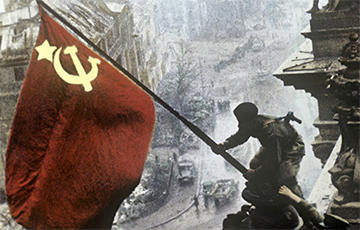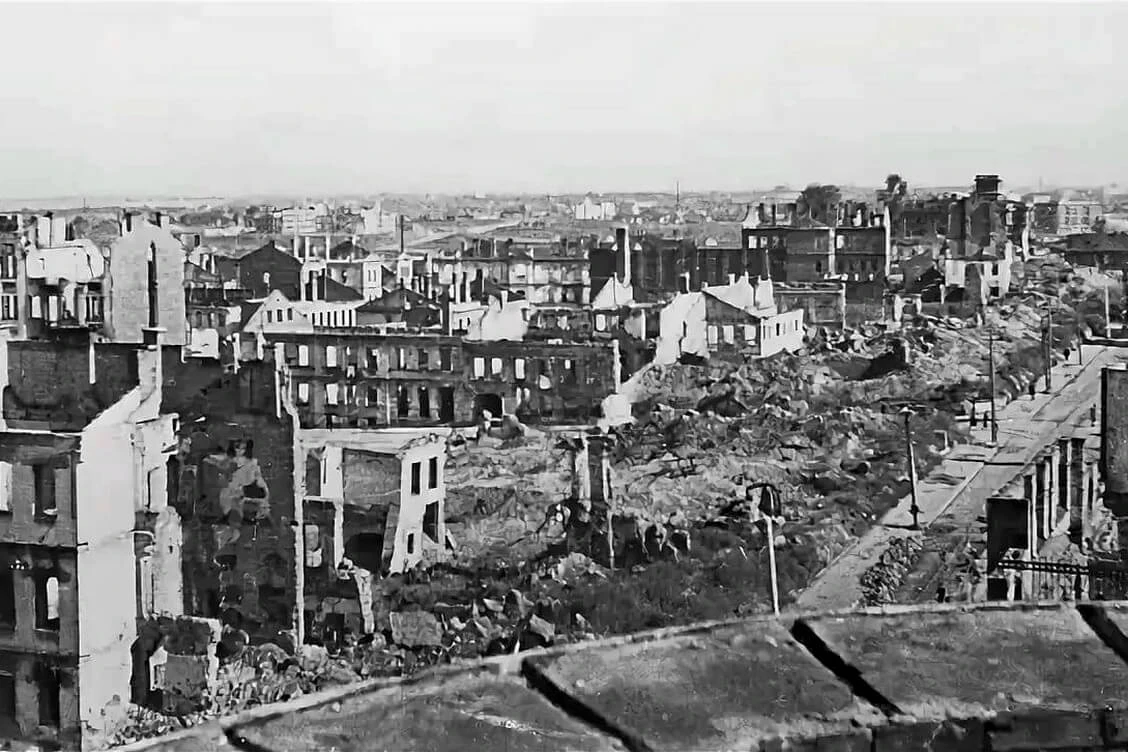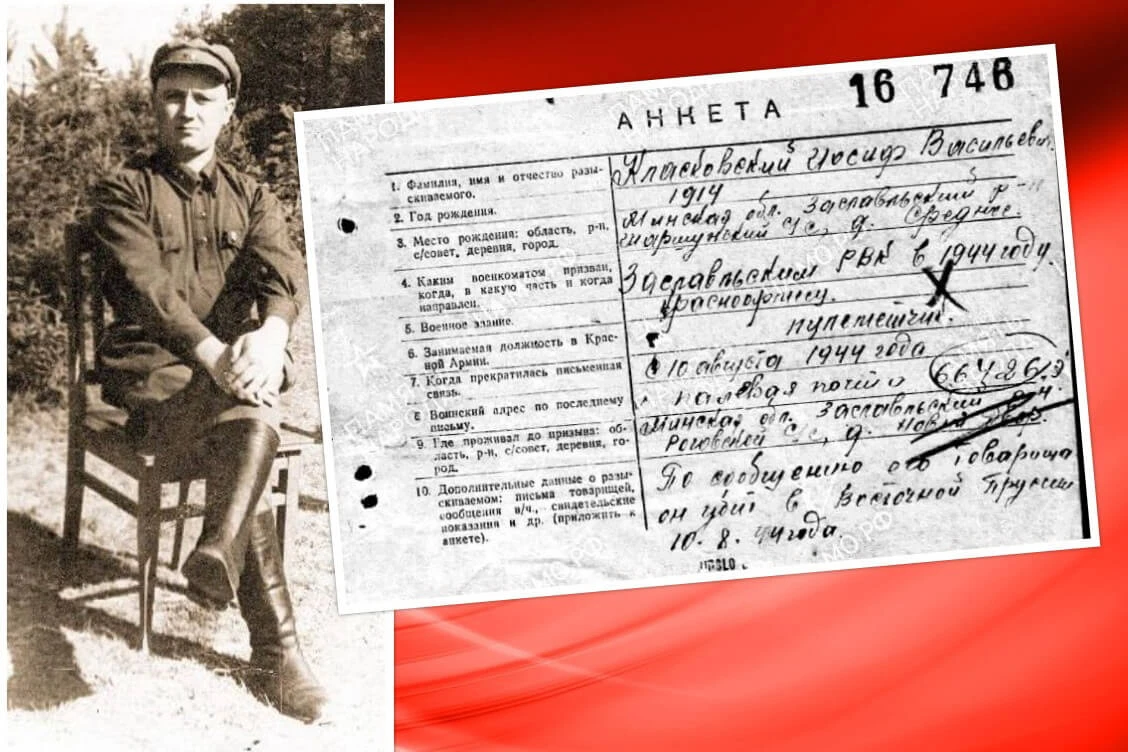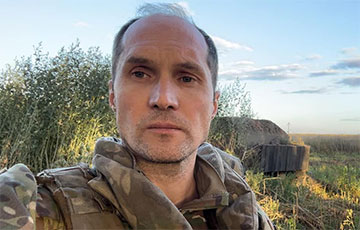"It's Like Those Guys With Briefcases And The Aunts With The Comb-overs Took The Reichstag."
36- 10.05.2025, 14:03
- 31,186

Two regimes cover the poverty of ideology.
Political analyst Alexander Klaskovsky writes on Pozirka about how war memory has been turned into political thrash:
- I still remember a time when surviving World War II soldiers were sturdy forty-five-year-old men. In the village bathhouse I saw terrible marks of wounds on their bodies. They did not like to remember the war. And if they remembered after a drink, it was not in a pathetic spirit. They remembered the pain, horror, trench mud, twisted intestines of the dead.
Were the front-line soldiers to be lifted from their graves, they would be dumbfounded by the fact that the mournful date has been turned into a political spectacle, which sometimes turns into an outright thrash, aptly called "victoriousness".
Beyond this propaganda bacchanalia is a purely utilitarian interest of the regimes of Alexander Lukashenko and Vladimir Putin. Pulling the owl over the globe, they try to whitewash their unsightly deeds under the brand of heirs of the Great Victory.
The two regimes cover up the poverty of ideology
May 9 was declared a holiday in 1945, but two years later the day was made a working day again. Joseph Stalin apparently felt that lavish celebrations were inappropriate, there was nothing much to celebrate. Too great were the losses, including because of his own mistakes. Too saddened the memory of the survivors.
The status of the weekend was returned in 1965, with the coming to power Leonid Brezhnev, who had a weakness for awards. Since then, Victory Day has been celebrated more and more pompously, and the general secretary has been wearing more and more stars on his chest.
For the sake of justice, we should note that he was still a front-line soldier. But sycophants began to exorbitantly inflate the participation of Colonel Brezhnev in the landing on the "Small Land" - the bridgehead near Novorossiysk - in 1943. This operation began to be portrayed almost as the decisive battle of the Second World War.
This is how the mythologization of that war gained strength. And in the USSR they preferred to talk about the Great Patriotic War (the fascists attacked treacherously, etc.).
By shortening World War II by two years, they tried to cut off the things that spoiled the beautiful concept. Namely, Stalin's alliance with Hitler, the secret plan to divide Europe between the two totalitarian regimes, the attack on Poland from both sides, the occupation of the Baltics. The way the USSR snapped its teeth on Finland. And the fact that Britain and France declared war on the Third Reich even when Moscow and Berlin acted according to the principle "hand washes hand".
In the post-Soviet period both Russian and Belarusian leadership faced the vacuum of ideology. It is not possible to say openly that we, they say, crave only boundless power and wealth. We need something noble and majestic. And then the bet was made on the concept of the Great Victory.
It was polished to the utmost. And most importantly - extremely instrumentalized. The ruling class of two authoritarian states claims the status of heirs of that Victory. It is as if these men with briefcases and aunts with comb-overs took the Reichstag.
And this status is needed as an indulgence, a carte blanche, a way to legitimize themselves, to justify their policies.
Thus, Putin portrays the aggression against Ukraine as a continuation of the struggle against Nazism. Lukashenko and his propaganda are also trying to paint those who protested against the usurpation of power in 2020 as fascists.
"Kiev was bombed, we were declared..."
The ruler of Belarus, born in 1954, presents himself as a contemporary of that war, uses the pronoun "we", as if trying on a Stalinist overcoat.
April 10, speaking about the upcoming exercises "West-2025," Lukashenko described the situation on the eve of Hitler's attack on the USSR as follows: "We were always appeasing the Germans. We tried to please them somehow. <�...> We did not even deploy armies, we were all engaged in pacification. And what? Putin correctly says: and after that we lied, cheated and so on. Enough is enough."
The bitter irony is that the cliched words about "treacherous attack of the aggressor," which are used to describe what happened on June 22, 1941, are absolutely appropriate to characterize the beginning of Russia's large-scale war against Ukraine on February 24, 2022.
The treachery consisted in the fact that Russian troops were concentrated for "blitzkrieg" under the guise of joint exercises on Belarusian territory.
And both Moscow and Minsk military commanders falsely assured that the scale of maneuvers did not exceed the parameters of the Vienna Document 2011, which require notification (9 thousand people). In fact, as experts later estimated, the Russian invasion forces from Belarus numbered about 30 thousand.
It was also falsely claimed that all units of the Russian army would be withdrawn to the places of permanent deployment after the exercises. And in the end - as in a famous old song: "Kiev was bombed, they announced to us that the war had begun".
Only there they meant the attack of the Nazis, and in 2022 Kiev was bombed by "brotherly Russia".
Stalin is also responsible for the three-year occupation of Belarus
In the context of the 80th anniversary of the end of World War II, the Belarusian bosses refrain from vowing to defend and preserve the historical truth. And the author of these lines with both hands is in favor of it.
The problem is that these figures take out of history only what is profitable for them, and in addition they embellish it greatly. If they talk about the tragic, they avoid an honest analysis of all the reasons.
The pro-government historian Igor Marzalyuk recently said that victory in that war was "the triumph of absolute good over absolute evil."
Let's face it. Yes, Hitlerism was terrible, but Stalin's regime was by no means the embodiment of absolute good.
Lukashenko moved Independence Day to July 3, the date of Minsk's liberation in 1944, but this is a false link. Belarus did not become independent then, it came back under the rule of Stalin's empire. And communist regimes were imposed on the countries of Eastern Europe. Attempts of their peoples to follow their own course were suppressed by tanks (1956 - Hungary, 1968 - Czechoslovakia).
At the solemn meeting on May 6, Lukashenko said: "Given the new burials of massacred people discovered on the territory of the republic during the Great Patriotic War, we are talking about every third person. But, I'm afraid, someday we will talk about every second."
And further: "The lesson has been learned. The Great Patriotic War was by no means the first invasion of the Slavic world from the West, incurably suffering from the disease of its own superiority."
Let's put aside the pathological anti-Westernism, the defectiveness of this "Slavophile" mythology.
In fact, in order to learn the lesson of history, it is necessary not to trumpet the victory joyfully from every iron, but to analyze comprehensively why that tragedy of apocalyptic scale happened.
The question should be raised why the victory was given at such an exorbitant price. Despite the fact that the military potential of the USSR before June 22, 1941 in many respects exceeded Hitler's.
And therefore, we must also talk about the colossal strategic miscalculations of Stalin, who did not believe in reports about Hitler's imminent attack and did not take measures to meet the invasion in full force.

It is also true that the Red Army personnel corps was slaughtered by repression. And many fighters surrendered at the beginning of the war because they did not want to fight for the Soviet government with its ruthless "dictatorship of the proletariat" (actually, the "Kremlin Highlander2). For the same reason there were many collaborators - including in Belarus.
Yes, the fascists were atrocious in the occupied territory. However, the blame for the three-year occupation of Belarus - let's be blunt - also lies on the "wise commander" Stalin.
Lukashenko in 2012, speaking about Lenin and Stalin, said: "I still have a long way to go before them."
Well, after 2020, the distance has considerably shortened. The regime began to acquire the features of totalitarianism, its opponents are given prison sentences worse than Stalin's. The cult of the leader's personality is flourishing.
And, as in Stalin's times, the whole country is paying dearly for the ruler's ambitions and exorbitant power-lust. Today, without any war, the Kremlin is quietly seizing Belarusian sovereignty.
Sensing the weakness of Lukashenko's position and his increased dependence on Moscow, the imperialists are imposing the so-called St. George's ribbon on Belarus, with which the seizure of Ukrainian lands has been firmly associated since 2014.
Don't dance on the bones!
I rarely write about personal, family matters. But when Lukashenko and his propagandists call critics of the regime heirs of fascists, I have something to answer.
My grandfather Iosif Klaskovsky, a Red Army machine gunner, died in battle with the Nazis during their brutal counterattack in East Prussia in August 1944.

But I remember about something else. Surviving veterans told me that the mobilized Belarusians were reproached for the years under occupation (as if they were guilty of it) and were primarily used as cannon fodder.
And I also remember that my great-grandfather Vaclav Klaskovsky, a simple peasant, was repressed in 1930 only for speaking out against forced collectivization at a meeting. He said that collective farms would be useless (by the way, Lukashenko, a big advocate of the collective farm system, justified the lack of potatoes in the stores as recently as May 8).
That's how the tragedy of the epoch was reflected in the family history.
One ancestor was exiled for "anti-Soviet agitation" (now Lukashenko's handmaidens call such a thing "extremism"). The second ancestor, his son, died in the meat grinder of the war, for the colossal losses in which the Stalinist regime was responsible.
That is the terrible truth about those times. For me, it is pain, not an excuse to dance on the bones.
It hurts when the spiritual heirs of Stalinism try to monopolize the image of Victory, turn the celebration into a fierce thrash, cover up the exploits of older generations to justify the strangulation of freedom.











